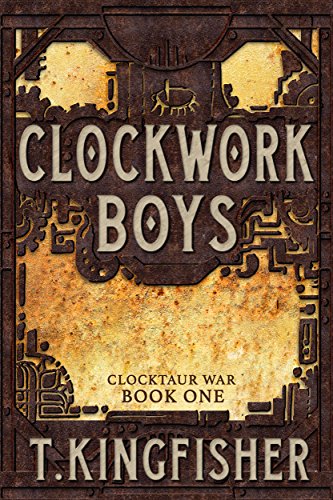
The Wonder Engine is the first in a series of books, the Clocktaur War, by T. Kingfisher. It follows a band of misfits as they try to find the secret of the Clocktaurs, a group of extremely powerful and possibly mechanical soldiers used by an enemy nation to threaten the home of the heroes. Those heroes — Slate, a forger and thief who also has some impressive fighting skills; Caliban, a paladin possessed by a dead demon; Brenner, an assassin; and Learned Edmund, a monk who has been cloistered away who believes being near women will literally destroy him: “‘Learned Edmund is apparently afraid that if he sleeps on your floor, your feminine exhalations will cause his genitals to wither and his bowels to turn to water.’” — have to travel to the heart of the enemy and figure out what the Clocktaurs are and how to stop them.
Kingfisher has created a very interesting world where some of the very common tropes in fantasy are tweaked just enough to create something new. Magic exists, but it is much more subtle than in many worlds. Some people are born with certain magical abilities, but they can’t do anything more. Slate, for example, has an allergic reaction whenever she is supposed to notice something. Others have the ability of creating tattoos that will literally eat people if they disobey orders: “What kind of turns did a life have to take before you discovered that your personal gift from the universe was making carnivorous tattoos?” Demons exist, and paladins exist to fight demons, though the demons cause most of their damage by possessing people. But, maybe more importantly, the characters are well fleshed out, with very distinct personalities and foibles. None of the characters are perfect, most aren’t noble, and even the paladin, who is by definition a very noble character, has his major flaws. Half of the book is about these characters getting to know one another as they march toward their destination, discovering themselves and other oddities of their world in the process.
The characters and the plot are both highly entertaining. The world has its own uniqueness that sets it apart from the types of books I read when I was younger, where the poor orphan boy goes on to become the world’s greatest magician and saves the multiverse. To be honest, this reminds me more of Joel Rosenberg’s The Guardians of the Flame series, which was one of my favorites as a kid where the characters aren’t saving the universe, but just trying to survive. The characters are the story, and the plot is just a way of introducing us to them. Clockwork Boys feels similar in spirit.